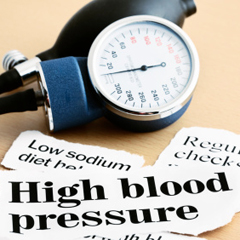 World Health Day is observed on April 7th .
World Health Day is observed on April 7th .
According to the American Heart Association, one out of every three adults (33%) suffers with elevated blood pressure, is at constant risk of heart trouble. 69% of people who have a first heart attack, 77% of people who have a first stroke, and 74% of people with chronic heart failure have high blood pressure. High blood pressure is also a major risk factor for kidney disease. High blood pressure is no longer just an affliction of the elderly, as more than one-third of young people between the ages of 16 and 34 are now said to suffer from some form of hypertension.
Even if you are middle aged and enjoy normal BP, you still have a 90% lifetime risk of developing hypertension. People with a systolic BP of 120 to 139 mm HG or a diastolic BP of 80 to 89 mm HG are considered borderline hypertensive and require immediate changes in diet and lifestyle.
Switching to a healthy diet can lower high blood pressure and prevent it from occurring in the future. Likewise, physical exercise helps lower and prevent high blood pressure and cardiovascular problems. The combination of good diet and physical activity works even better.
Dietary Nutritional recommendations: According to a new study presented at a recent medical conference in Washington, D.C, people who regularly eat yogurt as part of a healthy diet tend to have a lower risk of more serious problems like stroke, heart attack, congestive heart failure, kidney damage, or blindness later on down the road.
Coconut water is rich in potassium, electrolytes, and other important nutrients, coconut water has been shown to help significantly lower blood pressure levels in most of the people who drink it. Magnesium plays an important role in reducing Blood Pressure. Vitamin C is the key to reducing blood pressure.
Cayenne Pepper is probably the fastest way to lower High blood pressure. Mix one teaspoon of cayenne pepper with half a cup of lukewarm water or mix two tablespoons of raw organic honey with two teaspoons of cayenne pepper; boil them with eight ounces of water and drink when it is warm.
Hawthorne berries have rightly been called “food for the heart”. They lower blood pressure, as well as protect arterial walls and prevent and treat hypertension and angina.
Omega-3 fatty acids, such as those found in fish oil, have a significant impact on blood pressure. As a bonus, they lower triglyceride (blood fats) levels as well.
Garlic contains allicin, a substance which has antibacterial, antioxidant, lipid lowering and anti-hypertension propertiesStudies have proven that garlic significantly lowers both systolic and diastolic blood pressure.
Onions contain quercetin, an antioxidant flavonol found to prevent heart disease and stroke. Daily evening primrose oil pills can drop about 10 points off of both the bottom and top blood pressure numbers. Cinnamon helps lower blood pressure as well as circulating blood glucose, triglycerides, and LDL cholesterol.
Green tea helps prevent clogged arteries and keeps blood pressure under control. Ginger reduces blood pressure and prevents blood clots.
Cordyceps is a chinese herb which slows the heart rate, lowers blood pressure and yet also increases the blood supply to the arteries and heart. ALA, (alpha-lipoic acid) has also lowered blood pressure in a number of studies. Grape seed extract with oligomeric proanthocyanidins (OPCS) can lower high blood pressure.
Eating payaya on an empty stomach can lower high blood pressure within a month.
High blood pressure – A package of woe: A combination of factors like stress, alcohol, smoking, weight and lack of physical activity seem to have to come together to produce this problem, which is further compounded by family history and age. Blaming dietary sodium for high blood pressure is too simplistic; the real problem may be mineral deficiencies.”The problem is just as likely to be too little potassium, calcium and magnesium,”.
Dr. Sharad Kasarle, Medical Practioner in ‘Medicinal Herbalism’ as well as ‘Diet & Nutrition
